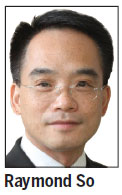Developing cultural tourism in Hong Kong
Updated: 2014-02-17 07:13
By Raymond So(HK Edition)
|
|||||||||
During the Chinese New Year holidays, my son and I spent six days in London. Certainly, it is not cheap to travel to London during the festive season; however, we both have not had an overseas trip for four years. Also, as my son is growing up, I am counting the days he can be with his dad. Hence, though the price tag for this short trip was not cheap, it was still money well spent.
London is an international city, so is Hong Kong. In many aspects Hong Kong is better than London, in particular in terms of city management. Hong Kong is more orderly than London, and Hong Kong's public transport system is also superior to London's. However, in terms of cultural elements, Hong Kong still has a lot to learn from London.
Hong Kong is famous for "East Meets West", so Hong Kong should be rich in cultural attractions. Nevertheless, Hong Kong does not having world-class attractions in terms of entertainment. One particular issue I observed during my short London trip was that the theater culture there can attract high-quality tourists all over the world, and help generate tourist income.
Take me for example. I went to watch Phantom of the Opera and Les Miserables and both are excellent entertainment. The shows are great and I had a good time. The tickets, however, are not cheap. For an average seat of a typical musical entertainment, the price can easily be over 50 pounds ($83.5), and it is not surprising to have much higher prices for the better seats. When one considers the amount that one will spend on the shows, the actual cost will be even higher. Nevertheless, the good shows always have a full house, suggesting that the big money is there. This leads me to think about how much economic benefit these musicals can generate.

Phantom of the Opera and Les Miserables have been popular for many years and the shows are still running. Many people in the audience actually come from overseas. There were Koreans, Japanese, Germans, Americans and Chinese around me during the shows. This is a clear indication that these musicals become great attractions to tourists. So it is also logical to say that world-class musical entrainment can bring tourists to London.
There are many theaters at London's West End - all with their own signature shows. When we look at Hong Kong, we do not seem to have these attractions. We do not have tourists coming to Hong Kong for these sorts of shows. When Hong Kong first started the West Kowloon Cultural Project, people then had the vision of developing West Kowloon into something like the West End. However, the piece of land has been lying there for over a decade without any major breakthrough. The sad thing is that, a second decade of idleness is approaching.
Of course, the West End did not develop into its current state overnight. The cluster of theaters there evolved in a natural way. To be able to say that West Kowloon is "Hong Kong's West End" will require many years of hard work. However, the key question is that we still do not have a clear direction on where we are going. We cannot have a planned economy and hope the government will direct the development of West Kowloon. There are already a lot of disagreements on the development of West Kowloon among different stakeholders. Nevertheless, the negotiations cannot take place forever. We simply do not have the luxury to have the discussion on the West Kowloon project for another decade.
So it is high time to fully realize the West Kowloon Development. As a public policy, public engagement is important. However, by definition, a public policy means that it will never please everyone. Surely different people will have different views, and the situation will be worse when it comes to those with artistic temperaments. As a cultural development project, many artists will have their demands and we need to respect them. The tricky point is that very often the views of artists contradict each other. If we had unlimited resources, we could accept all these different views and everyone will be happy. However, since resources are limited, we need to make some difficult choices.
If we really have a vision to transform West Kowloon into a West End, we have to be decisive. We cannot please every stakeholder and somehow we need to make decisions. After that there will be lots to do.
Raymond So is dean of the School of Business at Hang Seng Management College.
(HK Edition 02/17/2014 page9)